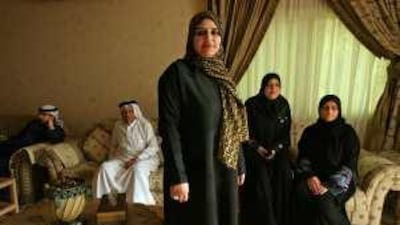It is hard to get all the al Emadi family in the same place at the same time. A busy bunch of 10 - five sisters, three brothers, and two loving parents - it takes weeks to bring just seven of the siblings together at the family home, a simple but radiant villa in Al Barsha.
Yet more significant than the number of al Emadis there are, is the number of degrees they have. The family is exceptionally well-educated, and it is their country that made them so. Which raises the question: why is their success the exception rather than the norm? "Al hamdulillah, the country paid for all of us for our education", said Ahmed, 40, the second-eldest sibling and a highly regarded surgeon who studied for 13 years in Scotland and Canada before returning to lead the ear, nose and throat department in Dubai's Al Baraha Hospital.
Some al Emadis studied free of charge in federal universities, while others secured spots in prestigious western institutes, paid for by the Ministry of Higher Education's scholarship programmes. They are highly opinionated about higher education, the direction the country's young people are heading and the UAE's critical need for science professionals. For them, education is a way of being loyal to their country.
"Patriotism is not just putting flags in your car," said Khaled, the youngest in the family and a graduate of the cellular biology and genetics programme at the University of Illinois at Urbana-Champaign. Instead, it is about gaining the expertise the country will need five or 10 years from now, even if the path is arduous. "There should be studies for our needs. We don't have planning for 10 years in the future," Ahmed said.
One such need is in medicine. "We have a lack of people in all the different specialities," he said. "I think the youth should look for what is needed in the marketplace and the country, not just to get a degree." Hence the family's degrees are almost exclusively within the scientific track, but in that they are atypical. According to the Ministry of Higher Education, twice as many students choose humanities or liberal arts as science.
"We always gravitated towards science books and our father was the type who encouraged us to take up the scientific tracks," said Fareeda, 34, a mother of two who graduated from UAE University's biology programme and now heads Dubai Municipality's microbiology laboratories. Today, young male scientists are a rare sight. "We have a crisis in the labs. All our employees are girls. We had just two males, and one of them resigned. We want to Emiratise but it's hard to get national men. I hope the young men go into these fields," she said.
This was put down to a lack of financial incentives. "If someone goes into management or business and graduates, their salary is higher than someone who studied 12 years in science", Ahmed said. "We shouldn't just think in terms of money, but this is the world now. People join whatever gets them more money." There are insufficient "filters" at university to ensure that only highly qualified individuals graduate as doctors for instance, Khaled said. A better system would create more diversity in the job market.
"Nationals don't work low-skilled jobs unless [they are] forced, and we don't have anyone forced to work low-skill jobs," he said. "If we had factories, doing production in the UAE, would you see a national working behind a machine?" Meanwhile, administrative jobs are attractive due to their availability, whereas professionals may have a long wait before finding a job in their field. Khaled, who now works as a senior financial analyst in Mubadala's health care department, said he waited for months after coming back from the US for a job related to his field, with no luck.
The al Emadi family's view is that to encourage young Emiratis to take up highly technical fields, the Government should encourage research by involving them in training programmes in the UAE with western researchers, sending them abroad for postgraduate education, then bringing them back to take over the posts of their former mentors. It also needs to encourage scientific pursuits early on in school.
Another obstacle is that while women constitute 70 per cent of students at federal universities, that figure declines to 46 per cent for postgraduate studies. This, the siblings believe, is partly due to ambition and partly due to financial incentives. "The new generation, the girls who come to train with us from the technical colleges, I don't really see academic ambition in them," said Sharifa, 42, the eldest among her siblings with a PhD in business management from the University of Pune in India.
Khaled is more critical. "We don't have that way of thinking to begin with," he said. "There are a lot of people that think: 'Now that I [have] finished school, I'll go work in something that would be comfortable, I'll work from the morning till noon then I'll go back home. I will have a salary and I will be comfortable'. They don't think about constant self-improvement, continuing studies." For the siblings, such dedication to self-improvement has a purpose. It is to fulfil their duty to the country. Using your qualifications to work in another country makes no sense, Ahmed said when asked why he returned home after his postgraduate studies. "This is my country. We have to return."
kshaheen@thenational.ae


